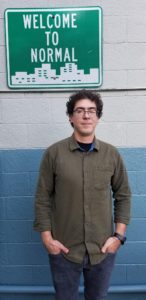 By: Gina Warren
By: Gina Warren
Whit Bolado is a fiction and nonfiction writer from Georgia whose work has appeared in Duende and Underground, the undergraduate literary journal of Georgia State University. His most recent publication, “What We Know of Them,” a story about relationships, change, and the function of collective voices, appeared in the Winter 2018 Issue of Rougarou.
Rougarou: Thank you for joining us, Whit. We are happy to have you here at Rougarou, and were thrilled to publish your work in our most recent issue.
Whit: Thank you.
Rougarou: Your piece “What We Know of Them” pushes the boundaries of nonfiction with its kaleidoscopic approach to point of view and narration through collective pronouns. These are relatively rare techniques. Could you say a little more about what drove you to make these decisions?
WB: When a group of people lives in close proximity to one another for months or years, events happen that eventually develop into stories that the group shares. Some of the details might differ from one person to the next, but there’s a core part of it that each person has a perspective on. When they get together to tell it, it’s those details that make their shared knowledge compelling and complete.
A large part of the reason I used a collective voice in this piece was to draw the reader in to it, to give the reader a sense of how this is something that people talked about and discussed while it was happening and even later on. As well, by interacting with or even simply witnessing the people around you, you’re building a shared history. The use of a collective voice draws the reader in on that as well, making them complicit in the knowledge of what’s taking place. These are two important aspects of why I used a collective voice in this story.
Rougarou: Were there any struggles or artistic challenges involved with choosing this collective point of view and maintaining the truth-value of this piece?
WB: Certain passages had to be from a single perspective, and it took a lot of late night conversations with “Randall” to develop a balance of fact, perspective, and ambiance for those scenes. There are parts that I won’t be able to confirm one hundred percent, and I simply have to take his word for it. In a way, though, I think this story tells a different kind of true story, getting back to the theme of collective knowledge creating shared history. Parsing out individual details from one person or another until you can feel comfortable with how truthful the whole story feels is part of that process.
Rougarou: What is your writing process? Do you keep a journal?
WB: My process changes depending on where I am. When I was writing “What We Know of Them,” I was spending two-to-four hours a day on busses and trains, so pretty much everything I produced during that time period started as notes that I would jot down, and then maybe on the next bus ride I’d expand it to a few pages, and then a week later, I’d have a printed copy I’d be marking up while trying not to spill my coffee as people jostle at the doors. Randall and I ran with the same friend groups, so a lot of my fact checking for that story was mostly done while hanging out on someone’s back porch or at a bar.
I have some other pieces I’m working on right now, and these are going to involve a little more work; there’s a piece I want to develop about Puerto Rico and their infrastructure. I was down there for a month volunteering, working at a restaurant to pay my way, and getting the chance to talk to Puerto Ricans firsthand. In that way, I’d say all of my stories are similar; seeing and experiencing a micro-culture leads me to explore the nuances of what might influence it.
Rougarou: How does change inform your writing?
WB: Most people need some aspects of habit in their lives in order to operate functionally. If there’s a person that you’re used to seeing every day, sometimes twice a day, or maybe even all damn day, you start to structure at least a part of your life around that person. If they leave it can take a lot of work to reset your expectations. This is the kind of thing that happens to everyone: it’s universal. I have a lot of cynicism in me, but I believe that people are capable of overcoming great setbacks in order to propel them further along in life, even if it’s a blundering, fallible mess. And just for the record, I think both Randall and Irene are in pretty good places in their respective lives now, and I’m excited for their next steps.
Rougarou: We’re glad to hear that. Whit, thank you so much for your time. We appreciate it.
